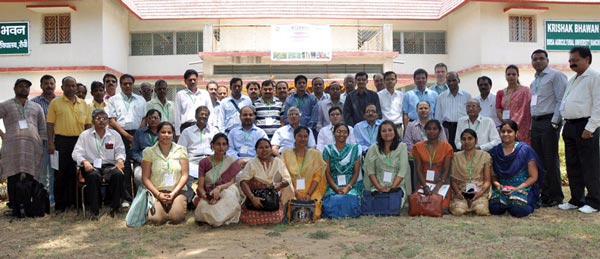A two-day workshop on potential technologies and policy environments for smallholder rainfed maize farming systems of Jharkhand state, India was organized jointly by Birsa Agriculture University (BAU), CIMMYT, and the International Plant Nutrition Institute (IPNI) during 16-17 April, 2012 at Ranchi, Jharkhand, India. The outcomes of the workshop will form part of CIMMYT’s IFAD-funded project on “Sustainable Intensification of Smallholder Maize-Livestock Farming Systems in Hill Areas of South Asia” and the MAIZE CGIAR Research Program (CRP).
There were 69 participants in total, including scientists, extension agents (KVKs), and students from BAU; key officials from the state department of agriculture National Food Security Mission (NFSM); and scientists from IPNI, the International Livestock Research Institute (ILRI), and CIMMYT. The workshop was inaugurated by BAU vice chancellor M.P. Pandey, while sessions and break-out group discussions were facilitated by Kaushik Majumdar, director of IPNI’s South Asia Program; JS Choudhary, state NFSM director; AK Sarkar, dean of the College of Agriculture at BAU; ILRI scientist Nils Teufel; CIMMYT scientists M. L. Jat and Surabhi Mittal; and IPNI deputy director T. Satyanarayana.
The workshop was made up of presentations on key topics, break-out group discussions, and a brainstorming session. The overall key themes were: (1) current status, constraints, and opportunities in different regions of Jharkhand , (2) conservation agriculture in maize and wheat systems, (3) approaches for crop-livestock integration, (4) integrated farming systems for food and nutritional security, (5) optimizing nutrient management for improved yield and profitability, and (6) approaches for inclusive growth for Jharkhand.
The five break-out groups discussed conservation agriculture (CA); site-specific nutrient management (SSNM); integrated farming systems and crop livestock interactions; enabling policies; and knowledge gaps, partnerships, networks and scaling-out strategies. The discussion outcomes were particularly focused on technology targeting and enabling environments and policies.
Agriculture in Jharkhand is at very low cropping intensity (~114%), despite good rainfall in most districts. The most critical issues include: rolling topography with very small holdings, leading to severe erosion due to lack of appropriate rainwater harvesting; soil acidity; lack of high-yielding stress-tolerant cultivars; very limited mechanization; and poor farmer access to inputoutput markets, coupled with resource poverty.
Building on the experience of CIMMYT’s hill maize project in the state, the participants agreed that optimizing cropping systems deploying CA practices could alleviate many of these problems, and sustainably increase crop production and productivity. Integrating CA with SSNM has shown promising results in improving nutrient use efficiency, currently another bottleneck in productivity gains due to inappropriate nutrient use. Crop-livestock integration is also key, as animals dominate farming in Jharkhand.
To implement these technologies and practices on a large scale, policy support is crucial. The outcomes of the workshop are being documented to serve as a policy paper for prioritization and implementation of technologies by the state, with the goal of arresting land degradation, improving crop productivity, and improving resource use efficiency and farm profitability.

 Capacity development
Capacity development 
